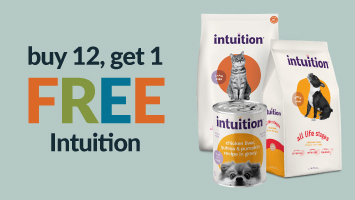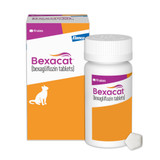Product details
Sulfasalazine is a disease-modifying antirheumatic drug (DMARD) with antibacterial and anti-inflammatory properties. In animals, it is most often used to treat inflammatory large bowel (colonic) disease.
This product is a standard tablet formulation (not delayed-release).
-
Used to treat inflammatory large bowel disease and vasculitis in dogs.
-
Can also be used to help treat inflammatory bowel disease in cats; however, it should be used cautiously, as cats may be sensitive to the salicylate component of this drug.
-
Do not use this medication in animals with intestinal or urinary obstructions, dry eye syndrome, or those with an allergy/sensitivity to salicylates or sulfonamide (“sulfa“) drugs.
-
May be prescribed for other animal species; please consult your veterinarian.
-
While this drug does not have an FDA-approved indication for all animal uses, it is commonly accepted for veterinarians to prescribe this medication for use in animals.
*Please note: This is a generic medication. Product packaging and appearance, including size, color, and shape, may differ from the description or images provided and are subject to manufacturer availability.
Product sourced directly from the manufacturer or their approved distributor. Guaranteed genuine product backed by the manufacturer.
For
Dogs and Cats
Active ingredient(s)
Sulfasalazine
Common brand names
Azulfidine, Sulfazine
Drug class
Disease-modifying antirheumatic drug, Anti-inflammatory agent
Product strength & size
This product contains 500 mg of sulfasalazine in each tablet. Please ensure the selected product and package size are appropriate for your pet, as recommended by your veterinarian.
For current availability, please refer to the product selection above.
Usage
Sulfasalazine Tablets should be given orally as directed by your veterinarian. Wash your hands thoroughly with soap and water after handling the medication. Please consult your veterinarian before making any changes or discontinuing the prescribed dosing schedule.
This medication should be given with food.
Individuals with a sulfa drug allergy should avoid handling this medication if possible. If handling is necessary, wear gloves and wash your hands thoroughly with soap and water afterward (even if gloves are worn).
Missed doses
Administer the dose as soon as possible. If it is almost time for the next dose, skip the missed dose and continue with the regular schedule. Do not give two doses at once.
Storage
Store in a cool, dry place at a controlled room temperature (68 to 77°F, brief excursions permitted between 59 and 86°F). Keep in a tight, light-resistant container and out of the reach of children and pets. Store away from heat and direct sunlight. Do not store in the bathroom, near the kitchen sink, or in damp places. The medicine may break down if exposed to heat or moisture.
Side effects
The skin and/or bodily fluids of the treated animal may become yellow-orange in color while taking this medication. This is not considered harmful, but the coloration may stain and be difficult to remove from fabrics (e.g., clothing, carpets).
Side effects are considered uncommon with this medication. Possible side effects include (but may not be limited to) decreased appetite and vomiting.
Contact your veterinarian immediately if your pet has persistent or severe vomiting or diarrhea; complete lack of appetite; extreme tiredness/low energy level; redness, discharge, or dryness of the eyes; increased blinking or squinting; severe skin reactions (e.g., rash); fever; pale gums; any signs of an allergic reaction (e.g., difficulty breathing, facial/throat swelling); or if you notice yellowing of the skin, whites of the eyes, and/or gums.
Notify your veterinarian if your pet experiences any of the effects described above, or if you notice any other side effects that are persistent or troublesome.
If you notice anything unusual, please consult your veterinarian.
Precautions
Do NOT use this medication in animals with gastrointestinal or urinary tract obstructions, dry eye syndrome, or that are severely dehydrated.
Individuals with a sensitivity or allergy to salicylates and/or sulfonamides should handle this medication carefully; avoid contact of the product with the skin and mucous membranes. Wear gloves when handling the medication if possible and wash your hands thoroughly with soap and water afterward (even if gloves are worn).
Use with extreme caution in certain dog breeds (e.g., Doberman pinschers, Samoyeds, and miniature schnauzers), as a serious sulfonamide-related immune condition can develop.
Although the use of this medication has been documented in cats, it should be used cautiously with careful dose adjustments. Cats may be sensitive to the salicylate component of this drug, and serious adverse effects can occur.
Use with caution in animals with preexisting kidney or liver impairment/disease or blood disorders.
Caution should also be exercised in dog breeds that are more susceptible to dry eye syndrome (e.g., cocker spaniels, bulldogs, West Highland white terriers, Lhasa apsos, Shih Tzus).
Safe use of this medication has not been established and should be used with caution in breeding, pregnant, or lactating animals. Discuss the risks of using this medication with your veterinarian if your pet is in one of these groups.
Do not administer to animals with a known history or suspected allergy/hypersensitivity to any salicylates (e.g., aspirin) or sulfonamide (“sulfa”) drugs, including this medication or any of its ingredients. Allergic reactions to medications may occur. Be sure to inform Vetsource and your veterinarian if your pet has any known drug sensitivities or allergies.
If your pet displays symptoms of an allergic reaction, discontinue therapy and call your veterinarian immediately or seek emergency veterinary attention. Symptoms may include (but are not limited to): swollen lips, tongue, face, or airways; difficulty breathing; agitation; profuse salivation; and widespread hives or itching.
Drug and food interactions
The following drugs* may have potential interactions with this medication: concurrent antibacterial agents, aspirin, cyclosporine, digoxin, folic acid, iron supplements (e.g., ferrous sulfate), methotrexate, NSAIDs, thiazide diuretics (e.g., hydrochlorothiazide), and warfarin.
*NOTE: this may not be a comprehensive list. Contact your veterinarian if your pet experiences any unusual reactions when different medications are given together.
Please ensure your veterinarian is aware of all medications and supplements that your pet is currently receiving. Your veterinarian may prescribe multiple medications, even if a potential drug interaction may occur. In these instances, your veterinarian may adjust the dosages or monitor your pet more closely.
Adverse reactions
If you are concerned that your pet has experienced an adverse reaction to this medication, please contact Vetsource Pet Owner Care at 877-738-4443.
Overdose
If you have any reason to suspect an overdose, call your doctor/veterinarian or the appropriate poison control resource immediately.
For humans:
The national toll-free Poison Help line, 1-800-222-1222, will connect you to your local poison center in case of emergency. This service is available nationwide and in most U.S. territories.
For animals:
The ASPCA Animal Poison Control Center is available 24 hours a day, 365 days a year at 888-426-4435.
Pet Poison Helpline® also provides a 24/7 animal poison control service at 855-764-7661.
*Please note: this information is for third-party services and is provided for convenience in case of potential poison-related emergencies. There may be consultation fee for these services.
Disclaimer
The content provided on this page is NOT medical advice.
All content, including the images and product description above, is intended for general informational purposes only and should not be considered a substitute for professional veterinary consultation, diagnosis, or treatment.
Consult your veterinarian for complete information about this product and how it fits into your pet's individual treatment plan.
Last revised: 7/15/2025
















